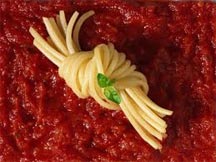10 Pasta-Cooking Tips You Gotta Know!
By Alice Osborne
 I was researching pasta-cooking and found some really helpful information on TheKitchen.com. Faith, the author, reminds us that cooking pasta doesn't exactly take a degree in rocket science. Here's her method:
I was researching pasta-cooking and found some really helpful information on TheKitchen.com. Faith, the author, reminds us that cooking pasta doesn't exactly take a degree in rocket science. Here's her method:
She says to first forget exact cooking times. Forget measuring out salt or olive oil by the tablespoon. There are really just two main tricks to keep in mind when cooking any kind of pasta.
 Cook pasta in a large amount of boiling water. An ample amount of water will dilute the starches coming off the pasta and prevent it from becoming gummy and mushy once cooked. For a box of pasta, use at least a 6-quart pot of water.
Cook pasta in a large amount of boiling water. An ample amount of water will dilute the starches coming off the pasta and prevent it from becoming gummy and mushy once cooked. For a box of pasta, use at least a 6-quart pot of water.
Salt the water heavily. And she means heavily! For a 6-quart pot, she throws in a healthy handful (or more) of kosher salt. She says that you want pasta water "salty like the sea." The salt doesn't do anything in terms of cooking the pasta; it's there entirely for flavor. The salt gets absorbed into the pasta during cooking, seasoning from the inside out and ultimately giving you a tastier final dish. Faith says to trust her on this one. Salting your pasta water (heavily) makes a huge difference!
 Aside from these two tips, remember to taste your pasta frequently to check on its cooking. Drain the pasta right before it's cooked to where you like it.
Aside from these two tips, remember to taste your pasta frequently to check on its cooking. Drain the pasta right before it's cooked to where you like it.
Now to conclude this succinct and really helpful tutorial, here are her readers' comments - more great tips on pasta cooking:
•  Do like the Italians and save a little of the cooking water to add to the pasta and sauce. It makes it even silkier and tastier.
Do like the Italians and save a little of the cooking water to add to the pasta and sauce. It makes it even silkier and tastier.
• DON'T add olive oil to the water as a way to prevent the pasta from sticking to itself. This will coat the pasta and prevent the sauce from sticking and absorbing into the pasta - the one thing you DO want.
•  Set the timer. Different pasta shapes cook in different amounts of time and when rushing to get dinner on the table (or even when not rushing), it's easy to forget how long the pasta has been boiling. There is nothing worse than overcooked, gummy pasta.
Set the timer. Different pasta shapes cook in different amounts of time and when rushing to get dinner on the table (or even when not rushing), it's easy to forget how long the pasta has been boiling. There is nothing worse than overcooked, gummy pasta.
• When cooking spaghetti and you'll be feeding small children, break the dry pasta in half before adding it to the boiling water. This way it all fits into the water, and it's easier for them to eat later.
•  Whole wheat pasta requires significantly more time to boil than regular pasta. If it's cooked for the same time as semolina pasta, it seems tougher and of a less nice consistency.
Whole wheat pasta requires significantly more time to boil than regular pasta. If it's cooked for the same time as semolina pasta, it seems tougher and of a less nice consistency.
• Add the salt only when the water has come to a boil. Otherwise the salt will sit on the bottom of the pot for enough time to corrode a stainless steel pot.
•  Cook extra (so it's a little under-done), and freeze. Pasta will freeze well, and when you've run out of time, or can't figure out what's for dinner, just pull it out, thaw quickly in the microwave, and dress it up. Voila...dinner!
Cook extra (so it's a little under-done), and freeze. Pasta will freeze well, and when you've run out of time, or can't figure out what's for dinner, just pull it out, thaw quickly in the microwave, and dress it up. Voila...dinner!
• Finally, my favorite tip: Lasagna noodles the easy way: layer uncooked noodles with your other lasagna ingredients. Refrigerate overnight. Bake, covered with foil, as usual the following day. The moisture from cheese and sauce layers softens the pasta and baking cooks it. No need to boil pasta first and no burned fingers from handling steaming hot noodles.

